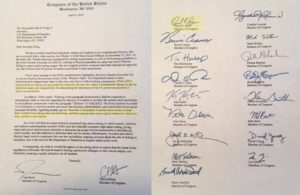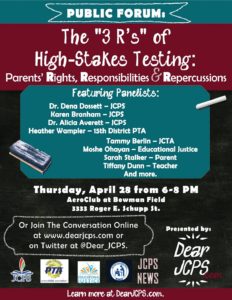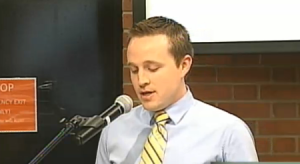 We have a great list of panelists for this Thursday night’s forum entitled The 3R’s of High-Stakes Testing: Parents’ Rights, Responsibilities and Repercussions. They have the experience and information to answer your questions regarding high-stakes tests, and will empower parents with the information you need to do what is best for your student, as well as recommend actions you can take to encourage district and state leaders to do what is best for all students when it comes to assessments and accountability.
We have a great list of panelists for this Thursday night’s forum entitled The 3R’s of High-Stakes Testing: Parents’ Rights, Responsibilities and Repercussions. They have the experience and information to answer your questions regarding high-stakes tests, and will empower parents with the information you need to do what is best for your student, as well as recommend actions you can take to encourage district and state leaders to do what is best for all students when it comes to assessments and accountability.
Unfortunately, JCPS has decided NOT to participate in our forum, despite originally agreeing to send three top-level administrators to serve. We are uncertain what new information would have prompted JCPS to suddenly decline our panel after our marketing and communications had already been placed into motion. As of this writing, JCPS has declined to respond to our list of parents’ questions, claiming that a document they forwarded from the state answers many of our questions (which it does not). For purposes of transparency, we wanted to share the conversations following our initial invitation to JCPS to participate in our panel regarding the forum so parents are aware of the dialogue that has taken place, and the district’s unfortunate unwillingness to provide the answers we feel parents are entitled to.
We have forwarded the list of the questions to an attorney at the state, as well. We will share everything we have learned on Thursday night. Join us!
Timeline of Conversations:
On April 14, I received the following email:
Dear Gay,
Thank you for the invitation.
Dr. Dena Dossett, Karen Branham and Dr. Alicia Averett will attend the forum on behalf of JCPS. They will be happy to answer questions during the forum.
I am sorry, but we are not able to provide Stewart Auditorium as a location for the event.
Please let us know at your earliest convenience when a location has been secured, so we can communicate that information to our staff. Also, please advise once you have a final list of panelists.
Sincerely,
Allison
On April 19 at 4:59 PM, I received the following email:
Dear Gay,
Today JCPS received the attached communication from KDE regarding “opting out.” I believe it answers many of your questions, and in light of the guidance it provides, JCPS will not be attending the forum next week.
The KDE guidelines are clear, and you may make copies of this letter to distribute to parents. KDE and the legislature sets the rules and JCPS follows those rules.
I apologize for the change in plans.
Allison
Allison Gardner Martin
Communications Director
JCPS
502-485-3551
On April 19 at 9:52 PM, I responded:
Hi Allison,
I am already familiar with the information in this document. It is not new information. We have done our research and had reviewed this document, along with many others, prior to collecting and sending our list of questions to you.
Although KRS does not allow a student to “opt out,” they can “refuse” the test. Doing so will result in a zero or novice score (there is contradictory information about this, which is why we continue to ask the question). The repercussions of “refusing” the test is what many of our parents’ questions revolve around. In addition, this document only pertains to the state test (KPREP). Our parents have questions about district assessments, test prep, and more. Furthermore, we are aware of an “opt out” letter than has been afforded to some parents, under “rare situations.” Lastly, the new ESSA law changes the game going forward, and affords teachers, administrators and school districts increased flexibility regarding opt out (see attached).
In light of the fact that the document you provided is not new information, we would appreciate if you could review our list of questions again and provide answers to the best of your ability, as well as continue to plan to have representatives on our panel. The marketing has already been purchased, flyers have already been printed and distributed, and parents still have the same questions as before. Nothing has changed since your acceptance of our invitation on Thursday. Declining now would be an affront to all parents and panelists who have expressed an interest and/or made plans to participate in the event.
We continue to look forward to your responses to our FAQs by the 21st, as well as your honoring your commitment to answer parent questions on the 28th.
Thank you,
Gay
On April 20, I received a call from Tom Hudson, Chief Business Officer, asking why I was continuing to promote JCPS’ attendance at our forum. I responded that I had not heard back from Allison, but felt that since nothing had changed since they first accepted our invitation, and the event was now less than a week away, it would be impractical and imprudent to not continue with our marketing that was already set in motion. Creating new graphics and flyers is a considerable drain of resources and expense, and takes time away from other important tasks at hand. Furthermore, I had every reason to believe that my bringing her attention to the fact that the information she forwarded was “old news” would encourage them to stay on our panel. Tom informed me that they do not support the parents’ rights to opt-out, and therefore would not be participating in our panel. I sent the below message in a follow-up email to Tom.
[Allison’s] statement that the “attached document” answers many of our questions was false. I had not heard anything else from Allison after sending my reply email, so I was operating under the assumption that my arguments were persuasive enough to continue with the panel (and still believe they are.)
I am disappointed that JCPS has decided to decline our invitation after we have already expended our resources designing and purchasing marketing materials and promoting the event, when nothing has changed from when the invitation was initially accepted. Meanwhile, our parents’ questions still remain unanswered.
Gay






